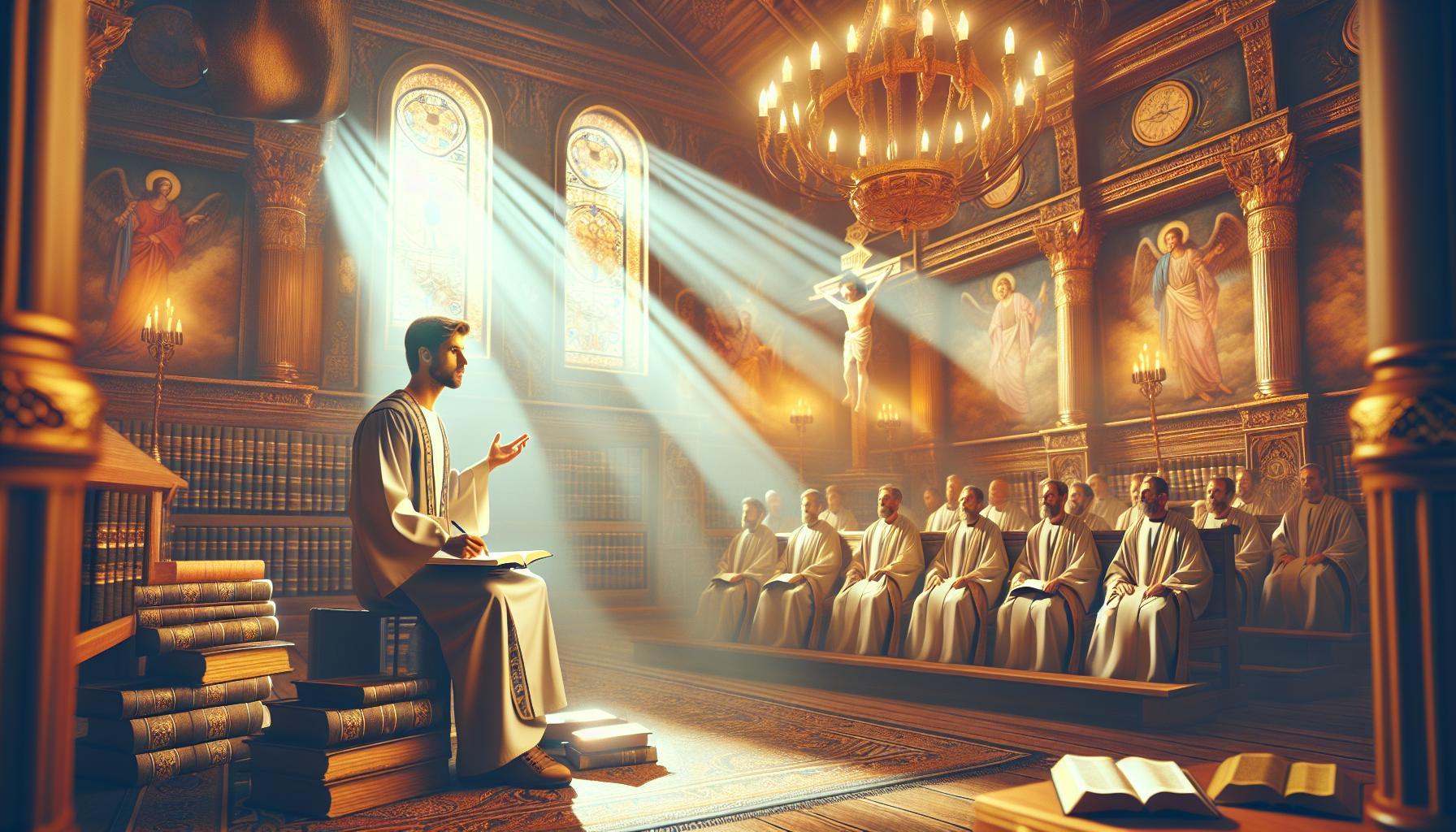Bishop Carlton Pearson, once a prominent megachurch pastor, sparked controversy by rejecting traditional beliefs about Hell and advocating for inclusivity. Following his passing in 2023, many wonder about his legacy and ongoing influence in religious discussions today. This exploration delves into Pearson’s transformative journey and the impact of his groundbreaking beliefs on modern faith communities.
The Evolution of Carlton Pearson’s Preaching Journey
The transformation of Carlton Pearson’s preaching journey is not just a personal evolution but a reflection of a broader shift in contemporary Christianity. Rising to prominence in the 1990s as a dynamic and engaging pastor, Pearson initially embraced traditional Pentecostal beliefs, focusing on the gospel of salvation through Jesus Christ. However, his path took a significant turn as he began to explore the inclusivity of God’s love, ultimately leading to his controversial rejection of the notion of hell. This radical departure challenged the conventions of his upbringing in the Church of God in Christ, influencing many and alienating others within his congregation and the wider evangelical community.
As he delved deeper into theological discussions, Pearson became a proponent of universal reconciliation, arguing that all souls would ultimately return to God. His message resonated with individuals seeking a more compassionate and accepting interpretation of faith. During this period, he even garnered a loyal following, drawn to his emphasis on love over condemnation. However, such progressive views led to his public ostracization from mainstream evangelical circles, resulting in the significant loss of his megachurch, Higher Dimensions Evangelistic Center.
Resilience and Continued Influence
Despite facing backlash and losing his church, Pearson’s commitment to his beliefs never wavered. He continued to speak at various conferences and gatherings, engaging audiences with his unique perspectives on spirituality and faith. His experiences not only inspired others to reconsider their theological stances but also prompted critical conversations about inclusion and acceptance within the church. Additionally, Carlton Pearson’s journey highlights the complexities of faith and the necessity for dialogue within religious communities.
Through his persistence, he has become a sought-after voice for those struggling with traditional doctrines. His evolution is a testament to the idea that faith is not static but rather a journey of discovery and growth. As discussions around articles like “Is Carlton Pearson Still Preaching? Discover His Journey and Influence” circulate, they underscore the relevance of his teachings in contemporary spirituality. Pearson’s story serves as both a cautionary tale and an inspiring example of following one’s convictions, even in the face of adversity.
In summary, illustrates a compelling narrative of faith, resilience, and transformation. As he continues his work, his influence remains evident in the lives of many who find hope and a sense of belonging under his expansive interpretation of God’s love.
Embracing Inclusivity: Carlton Pearson’s Shift in Theology
Carlton Pearson’s theological evolution is not just a personal journey; it’s a reflection of a broader movement towards inclusivity within religious communities. His pivot from a traditional evangelical stance to embracing a more expansive view of spirituality has resonated with many who feel marginalized. With a bold conviction, Pearson challenges conventional dogmas, inviting others to explore a more loving and accepting interpretation of faith.
Transformative Beliefs
Central to Pearson’s shift is his belief in universal reconciliation, the notion that ultimately everyone will find acceptance and love, regardless of their earthly actions or beliefs. This groundbreaking perspective has led him to question the prevailing doctrines of hell and condemnation that often dominate evangelical teachings. As he articulates in various sermons and writings, the essence of God is love, and this love transcends the barriers of doctrine, race, and sexuality. Pearson asserts that:
- Divine Love is Unconditional: God’s love is extended to all, not just a select few.
- Redefining Salvation: Instead of a narrow path, salvation is a wider journey towards understanding and grace.
- Embracing Diversity: Recognizing and celebrating differences among people is pivotal to spiritual growth.
His ideas challenge followers to rethink their preconceived notions about faith and community, encouraging a shift from exclusion to inclusion. Many who’ve followed Pearson’s journey have found solace in his teachings, asserting that faith can be a source of togetherness rather than division.
Practical Strategies for Embracing Inclusivity
To adopt a more inclusive approach in spiritual communities, Pearson’s teachings provide actionable steps:
- Engage in Dialogue: Foster open discussions about faith that respect diverse perspectives.
- Practice Active Listening: Encourage community members to share their unique experiences and beliefs.
- Promote Education: Create workshops that educate about different cultures, orientations, and belief systems.
By incorporating these practices, religious organizations can cultivate a healthier environment conducive to spiritual exploration and acceptance. Pearson’s influence has inspired many to redefine their relationship with God and each other, reflecting a profound commitment to love over judgment.
In examining “Is Carlton Pearson Still Preaching? Discover His Journey and Influence,” one can see that his legacy goes beyond his sermons; it’s an evolving narrative that champions inclusivity and respect. Through his example, communities can navigate the complexities of faith and foster a more comprehensive understanding of spirituality that honors every individual’s worth.
From Controversy to Community: How Pearson’s Message Resounded
Carlton Pearson’s journey from a celebrated megachurch pastor to a figure branded as a heretic highlights a profound transformation that resonates with many individuals seeking a more inclusive spiritual path. When he began to publicly deny the traditional view of hell, advocating instead for universal reconciliation, the fallout was significant. Many of his peers rejected his teachings, causing a schism within the church community he had once led. This pivotal moment was not the end, but rather a new beginning, leading Pearson to cultivate a message centered on acceptance and love.
Building Bridges through Understanding
Pearson’s shift in doctrine has sparked crucial conversations about faith and inclusion. He emphasized that love should be paramount in spiritual teachings, stating that the essence of God is fundamentally loving and forgiving. This perspective not only attracted those disillusioned with mainstream religion but also fostered a community of seekers and former believers looking for a new spiritual home. By moving away from fear-based theology, he provided an alternative that resonates with many, encouraging them to explore their faith without the constraints of conventional dogmas.
Creating a New Community
The repercussions of Pearson’s controversial stance have led to the formation of diverse communities that echo his teachings. These groups emphasize the importance of spiritual dialogue that transcends traditional boundaries. His approach encourages individuals to embrace a universalist perspective, recognizing that spirituality is not confined to rigid doctrines or hellfire preaching. By reframing theological discussions around love and grace, he has attracted diverse members, including those from other faith backgrounds and LGBTQ+ communities.
- Inclusivity: Pearson’s message advocates for acceptance across various identities and backgrounds.
- Dialogue: He inspires open conversations about faith, challenging the fear that often accompanies spiritual explorations.
- Support: Community initiatives often provide support for those disenfranchised by traditional religious environments.
As discussions about spirituality evolve, bringing together individuals who seek a fulfilling spiritual experience, the relevance of Pearson’s message remains powerful. His ability to transform controversy into community demonstrates that even the most challenging circumstances can lead to profound connections and a shared commitment to fostering an environment of unconditional love and acceptance. Through his journey, many continue to ask, “Is Carlton Pearson still preaching?”, reflecting a yearning for the inclusive and embracing message he has championed throughout his life.
The Role of Faith in Pearson’s Personal Transformation
Carlton Pearson’s journey reflects a profound transformation rooted deeply in faith, illuminating the complexities of belief in a modern context. As he navigated his role as a prominent pastor, Pearson encountered a critical turning point when he began to question conventional doctrines, particularly the existence of hell. This introspection was not just an intellectual exercise; it was a spiritual awakening that would redefine his life and ministry. His faith journey serves as a testament to the idea that true belief can lead to revolutionary shifts in worldview, pushing individuals to align their spiritual convictions with their understanding of love and inclusivity.
The catalyst for Pearson’s transformation was his commitment to the idea of a loving God who could not condemn humanity to eternal damnation. Through his exploration of universalism, he embraced the belief that all people are ultimately included in God’s grace. This led him to publicly reject the traditional views of hell. His bold stance, however, came with significant consequences. Once celebrated as a leading figure in the Pentecostal movement, Pearson faced condemnation from peers, losing his congregation as well as his position within the community. Yet, he found new opportunities for ministry that aligned more closely with his evolving beliefs, embracing a message of hope and inclusivity that reached out to marginalized communities, including the LGBTQ+ community.
Pearson’s experiences underscore the importance of resilience and authenticity in the face of adversity. The role of faith in his transformation became a beacon for others questioning their beliefs, encouraging them to pursue personal truth rather than conform to traditional expectations. He demonstrates that faith can be a powerful tool for empowerment, guiding individuals to seek deeper understanding and meaning in their spiritual journeys. By sharing his story, Pearson not only redefined his own narrative but also inspired countless others to consider the expansive nature of faith and its potential for transformation.
In reflecting on the question, “Is Carlton Pearson still preaching? Discover his journey and influence,” it becomes evident that his legacy extends beyond conventional preaching. Rather than simply providing traditional sermons, Pearson’s influence permeates modern spirituality, emphasizing inclusivity and unconditional love. His life exemplifies the profound impact that a transformative faith can have, providing a roadmap for others seeking to reconcile their beliefs with a deeper understanding of humanity and divine love.
Inspiring Others: Carlton Pearson’s Influence on Modern Preaching
Carlton Pearson’s remarkable journey from a celebrated megachurch pastor to a controversial figure who reshaped the narrative around traditional Christian beliefs has left an indelible mark on modern preaching. His willingness to challenge the status quo—particularly his rejection of the doctrine of Hell—opened up essential discussions within the Christian community about faith, inclusivity, and the nature of salvation. Pearson’s influence goes beyond mere doctrine; it encourages both preachers and congregants to embrace a broader interpretation of spirituality, focusing on love and acceptance rather than condemnation.
Challenging Traditional Norms
Pearson’s transformative message resonated with many who felt alienated by traditional teachings. By advocating for a gospel centered on unconditional love and grace, he inspired countless pastors to rethink their own approaches to preaching. This shift is particularly relevant today as many congregations strive to be more inclusive and embrace diverse viewpoints. For instance, the increasing number of LGBTQ+ affirming churches can be traced back to leaders like Pearson who dared to question long-held beliefs. His teachings invited others to explore deeper spiritual truths without the fear of exclusion or judgment.
Empowering a New Generation of Leaders
Inspirational figures such as Pearson empower a new generation of church leaders to prioritize authenticity over adherence to outdated dogma. They encourage emerging pastors to create spaces where parishioners can engage in dialogue about faith and spirituality openly. This emphasis on inclusivity extends to a variety of social issues, including racial justice and gender equality, which are increasingly addressed from the pulpit. Pastors influenced by Pearson’s journey often highlight the importance of acknowledging personal experiences and stories, knitting a tapestry of diverse narratives that enrich their communities.
Practical Steps for Embracing Change
For those looking to integrate Pearson’s influence into their preaching, consider these actionable steps:
- Engage with your community: Host open forums or discussion groups where congregants can voice their doubts and experiences.
- Explore diverse theological perspectives: Read widely and consider incorporating teachings from varied Christian thinkers to broaden your congregation’s understanding.
- Preach grace over judgment: Center sermons around themes of love, acceptance, and reconciliation, reflecting a more inclusive faith.
The essence of Carlton Pearson’s impact on modern preaching lies not just in his words, but in the gradual shift he inspired within the Christian community. This evolution beckons a fresh understanding of faith—one where questions are welcomed, and love drives all action. Engaging with his journey provides valuable lessons for those who wish to foster understanding and connection in their own congregational settings.
Exploring the Impact of Pearson’s Message Across Denominations
Carlton Pearson’s journey is a remarkable narrative that has shaped conversations across various Christian denominations. Known for his progressive theology, Pearson emerged as a prominent figure in the late 20th century, but his controversial views on Hell particularly challenged traditional Christian beliefs. His assertions that Jesus’s love extended universally—a stance encapsulated in what he referred to as “the gospel of inclusion”—resonated deeply with many who felt alienated by conventional doctrines. This theological shift sparked significant debate and, ultimately, led to both support and opposition within the evangelical community.
The Ripple Effect of Pearson’s Teachings
The impact of Pearson’s message transcended his own church milieu, influencing a broad spectrum of denominations including United Methodists, Episcopal churches, and progressive Pentecostal groups. Pearson’s ideas emphasized a shift towards inclusivity and understanding, advocating that God’s love embraces all, challenging the traditional notions of eternal punishment. This message offered hope to those struggling with faith amid modern societal issues, such as LGBTQ+ acceptance and racial justice. His stance encouraged congregations to re-evaluate the foundational tenets of their beliefs and adapt to more compassionate interpretations of scripture.
- Inclusivity: Promoting acceptance across different communities, particularly the LGBTQ+ population, encouraged a broader dialogue on theology.
- Reinterpretation of Scripture: Pearson urged believers to approach biblical texts more contextually, which led to a rich variety of interpretations across congregations.
- Social Justice: His commitment to the marginalized highlighted the need for church communities to engage with contemporary social issues.
Transformative Conversations Across Faiths
Pearson’s influence stimulated transformative conversations beyond individual churches, prompting inter-denominational dialogues that focused on unity rather than division. His teachings encouraged congregational leaders to explore their own faith convictions critically and align them with actions towards inclusivity and social responsibility. As many denominations began to engage with Pearson’s ideas, they found themselves enriched by these new perspectives, fostering environments where questioning and discussion could thrive without fear of reprisal.
Pearson’s commitment to spreading a message that celebrates God’s unconditional love has reinvigorated discussions about salvation and grace, demonstrating that theological evolution is possible within modern Christianity. His life and ministry serve as a potent reminder of the profound impact that one individual can have across diverse faith traditions, touching souls and prompting reflective change in communities across the globe.
Navigating Challenges: The Spiritual and Social Dynamics of Pearson’s Path
Carlton Pearson’s journey through faith is a profound example of navigating spiritual and social challenges. Once heralded as a prominent megachurch pastor, Pearson faced significant adversity when he began to question the traditional concept of Hell that was prevalent in evangelical Christianity. This internal struggle not only challenged his theological beliefs but also placed him on a collision course with many of his peers, leading to his estrangement from a community that once embraced him. His experiences illuminate crucial dynamics within religious institutions that often resist divergent views.
Despite facing backlash and being labeled a heretic, Pearson’s commitment to his evolving beliefs ultimately shaped his ministry’s direction. Transitioning from a conventional evangelical stance to an inclusive theology that emphasizes universal redemption, he modeled how individuals can confront and redefine their beliefs amid societal pressure. This transformation was not merely personal; it served as a catalyst for broader discussions within various faith communities about the nature of salvation, acceptance, and spiritual truth.
To effectively navigate similar challenges, aspiring spiritual leaders and followers alike can take several actionable steps:
- Embrace Open Dialogue: Promote discussions that welcome differing perspectives in faith communities.
- Seek Understanding: Invest time in studying varying theological frameworks to appreciate diverse interpretations of faith.
- Build Support Networks: Find circles of trust where questioning and exploration are encouraged without fear of judgment.
- Prioritize Compassion: Foster environments that prioritize love and acceptance over doctrinal purity.
As Pearson’s story demonstrates, navigating the complexities of faith and belief can lead to transformative insights, not only for the individual but also for the wider community. His legacy challenges others to reflect on the importance of inclusivity and understanding, making it clear that spiritual journeys can be profoundly impactful when they embrace the breadth of human experience.
Practical Insights: Lessons from Carlton Pearson’s Ministry Experience
Carlton Pearson’s journey through ministry presents a compelling case study on faith, transformation, and the courage to challenge established doctrines. His initial rise as a prominent megachurch pastor, leading the Higher Dimensions Evangelistic Center, showcased his dynamic preaching style and ability to connect with diverse congregants. However, his pivotal shift away from traditional views on hell not only redefined his ministry but also ignited a deeper conversation about inclusivity and the essence of divine love.
Embracing Controversy with Grace
One of the most profound lessons from Pearson’s experience is the importance of standing firm in one’s beliefs, even when faced with backlash. When Pearson publicly rejected the concept of eternal damnation, he was labeled a heretic by many within the church community. This teaches us that authentic faith often requires boldness and vulnerability. Here are key takeaways:
- Evaluate Beliefs: Regular self-reflection and study can help clarify one’s convictions and distinguish personal revelation from inherited doctrines.
- Encourage Dialogue: Open discussions about faith—without judgment—can lead to a deeper understanding of differing perspectives.
- Resilience in Adversity: Facing opposition can strengthen one’s resolve. Building a supportive community is crucial during transformational times.
The Power of Inclusion
Throughout his ministry, Pearson advocated for a message of inclusivity, emphasizing that everyone holds a valuable place in the heart of the divine. His approach encourages followers to consider a broader notion of spirituality that transcends dogma. By embracing inclusion, individuals can cultivate stronger communities and foster environments of mutual respect and understanding. Practical steps include:
- Practice Empathy: Engage with various viewpoints to cultivate a broader understanding of faith and spirituality.
- Build Diverse Communities: Encourage participation from different backgrounds in spiritual activities to enrich collective experiences.
- Promote Universal Love: Share messages that uplift all individuals, focusing on common human experiences rather than divisive doctrines.
Carlton Pearson’s legacy invites us to reflect on our own paths within faith and spirituality. His willingness to explore and redefine established beliefs serves as a reminder that the journey is often as significant as the destination. By asking ourselves, “Is Carlton Pearson still preaching?” we also engage with the larger question of how we can expand our own understanding of ministry and community in meaningful and transformative ways.
FAQ
Is Carlton Pearson Still Preaching?
Carlton Pearson is still active in ministry, but his approach has evolved significantly. He has shifted from traditional evangelical preaching to a more inclusive and progressive message of love and acceptance.
While Pearson may not be preaching in the conventional sense every Sunday, he continues to speak at various events and conferences, sharing his unique perspective on faith. His journey has influenced many, especially through his advocacy for universal reconciliation and his focus on spiritual healing.
What is Carlton Pearson’s Journey in Ministry?
Carlton Pearson’s journey in ministry is marked by both success and controversy. Originally a successful Pentecostal pastor, he faced challenges after embracing a new theology of inclusion that emphasized salvation for all people.
This shift led to a significant fallout within his church community, yet it opened doors to new teachings and broader audiences. His experiences highlight the tension between traditional beliefs and emerging theological perspectives, inviting people to reconsider their understanding of faith.
Why Does Carlton Pearson Advocate for Inclusivity?
Carlton Pearson advocates for inclusivity because he believes in a God who loves everyone unconditionally. His theology promotes the idea that no one is beyond redemption.
This belief stems from his personal experiences and shifts in thinking, leading him to reject the notion that only a select few are saved. Pearson’s teachings encourage followers to embrace compassion and understanding across different faiths and backgrounds.
Can I Attend Carlton Pearson’s Events?
Yes, you can attend Carlton Pearson’s events, which are open to the public. He speaks at a variety of gatherings, including religious conferences and workshops focused on inclusivity.
To find upcoming events, you can check his official website or follow him on social media platforms. Attending these events can provide deeper insights into his teachings and the changes he advocates within modern Christianity.
What Influence Has Carlton Pearson Had on Modern Theology?
Carlton Pearson has significantly influenced modern theology, particularly through his embrace of progressive ideas. His teaching on universalism challenges conventional Christian beliefs about salvation.
Many theologians and congregations have begun to explore the implications of his message, creating dialogues about faith, acceptance, and community. Pearson’s journey invites a broader understanding of spirituality that resonates with a contemporary audience.
How Has Carlton Pearson’s Message Changed Over Time?
Carlton Pearson’s message has evolved from conservative evangelicalism to a more inclusive and healing-oriented theology. Initially preaching traditional messages, he later focused on the inherent goodness of humanity and God’s love for all.
This transformation not only impacted his personal beliefs but also resonated with many who felt marginalized by mainstream religious views. His journey serves as a powerful reminder of the potential for change within faith communities.
Where Can I Learn More About Carlton Pearson’s Influence?
You can learn more about Carlton Pearson’s influence through various online resources and interviews. His books and documentaries provide insights into his beliefs and experiences.
For a more in-depth exploration, consider visiting related ministries and watching his speaking engagements available online. Engaging with his work offers valuable perspectives on the changing landscape of faith in today’s world.
To Wrap It Up
As we reflect on the profound journey of Carlton Pearson, it becomes clear that his influence extends far beyond traditional preaching. Known for his radical shift in belief regarding the existence of hell, Pearson’s ministry has sparked conversations across various theological spectrums, encouraging many to reconsider their understanding of grace and inclusion. His story is not just about personal transformation but also about challenging established doctrines and fostering a more expansive view of faith.
Whether you resonate with his message or find it controversial, exploring Pearson’s legacy invites a broader dialogue on the nature of belief, community, and spiritual practice. His life serves as a call to embrace compassion and understanding within our diverse faith communities. For those involved in baptism and preaching ministries, engaging with Pearson’s insights can cultivate a deeper sense of mission and outreach in today’s evolving spiritual landscape.
We encourage you to delve deeper into Carlton Pearson’s impact on contemporary spirituality and the theological implications of his work. Reflect on how his journey might shape your own beliefs and practices, and consider the ways in which inclusivity and love can inform your ministry. Let this exploration inspire you to embrace the complexity of faith while uplifting those around you in unity and understanding.





